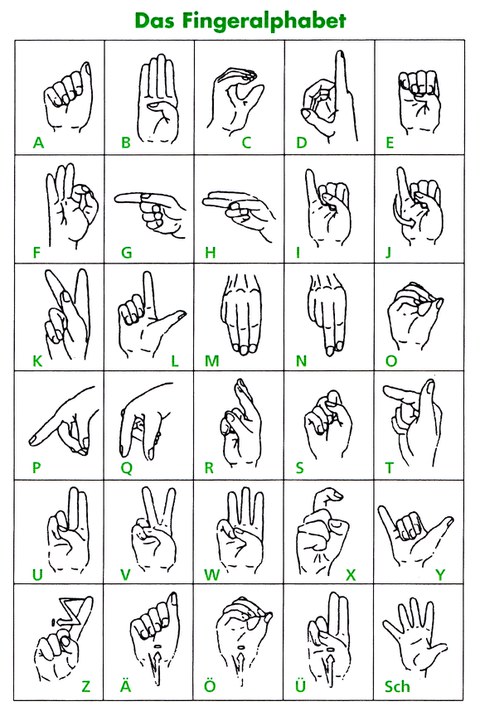Sep 26, 2022
Beyond the Silence - Talking Silently: On the International Day of Sign Languages

Das deutsche Gehörlosenalphabet mit Umlauten und Sonderzeichen für »SCH«, zur Verfügung gestellt vom Landesverband Bayern der Gehörlosen e. V. und unterstützt von der AOK Bayern (Quelle: Wikimedia Commons)
Since 2017, the International Day of Sign Languages (#IDSL) has taken place on September 23 every year. This international day of action dedicated to sign languages was initiated by the World Federation of the Deaf, an international NGO and interest group of 135 national associations, which campaigns for the rights of around 70 million deaf people worldwide, because the preservation of deaf culture and sign languages stands for a fundamental human right.
Although sign language has been used for centuries, German Sign Language was only recognized as a separate language twenty years ago, in 2002. Sign language has only been researched and documented since the second half of the 20th century. Until then, this form of communication had not been taught in schools; deaf children should learn to read lips or imitate sounds themselves. But lip reading is not only tedious and quickly offers numerous sources of error, it also makes learning more difficult, which has a negative effect on writing and reading. Due to these circumstances, the German Sign Language is more orally oriented and uses mouth positions together with facial expressions and hand signs.
In German Sign Language there are six basic hand forms and about 32 hand forms that are supplemented by the finger alphabet. The vocabulary of the sign language itself did not develop in accordance with the spoken language, but independently. Becoming acquainted with sign language allows glimpses of a fully visual form of communication that involves the whole body, allowing people to be much more aware of, observe and focus on one another. This contributes to higher sensitivity for language and communication and also expands one's own possibilities of expression.
The Diversity Management department at the TU Dresden is committed to diversity and inclusion: The "Barrier-free events" budget provides the opportunity to receive financial support to make events at the TU Dresden barrier-free through the support of sign language or speech-to-text interpreting services. The department 9.3 Diversity Management of the TU Dresden will be happy to support you in the search for suitable providers or a budget application. ( ).
